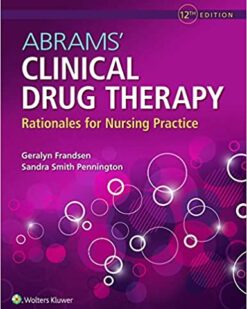Description
Text
I. Professional Foundations of Medical-Surgical Nursing
1. Foundations for Medical-Surgical Nursing
2. Interprofessional Collaboration and Care Coordination
3. Cultural Considerations
4. Ethical Concepts
5. Palliative Care and End-of-Life Issues
II. Clinical Principles of Medical-Surgical Nursing
6. Geriatric Implications for Medical-Surgical Nursing
7. Oxygen Therapy Management
8. Fluid and Electrolyte Management
9. Acid-Base Balance
10. Overview of Infusion Therapies
11. Pain Management
12. Complementary and Alternative Care Initiatives
13. Overview of Cancer Care
14. Overview of Shock and Sepsis
III. Managing the Surgical Experience
15. Priorities for the Preoperative Patient
16. Priorities for the Intraoperative Patient
17. Priorities for the Postoperative Patient
IV. Promoting Health in Patients With Immune Disorders
18. Assessment of Immune Function
19. Coordinating Care for Patients With Connective Tissue Disorders
20. Coordinating Care for Patients With Immune Disorders
21. Coordinating Care for Patients With Multidrug-Resistant Organism Infectious Disorders
22. Coordinating Care for Patients With HIV
V. Promoting Health in Patients With Oxygenation Disorders
23. Assessment of Respiratory Function
24. Coordinating Care for Patients With Infectious Respiratory Disorders
25. Coordinating Care for Patients With Upper Airway Disorders
26. Coordinating Care for Patients With Lower Airway Disorders
27. Coordinating Care for Critically Ill Patients With Respiratory Dysfunction
VI. Promoting Health in Patients With Circulatory or Perfusion Disorders
28. Assessment of Cardiovascular Function
29. Coordinating Care for Patients With Cardiac Dysrhythmia
30. Coordinating Care for Patients With Cardiac Disorders
31. Coordinating Care for Patients With Vascular Disorders
32. Coordinating Care for Critically Ill Patients With Cardiovascular Dysfunction
VII. Promoting Health in Patients With Hematological Disorders
33. Assessment of Hematological Function
34. Coordinating Care for Patients With Hematological Disorders
VIII. Promoting Health in Patients With Neurological Disorders
35. Assessment of Neurological Function
36. Coordinating Care for Patients With Brain Disorders
37. Coordinating Care for Patients With Spinal Cord Disorders
38. Coordinating Care for Patients With Peripheral Nervous System Disorders
39. Coordinating Care for Critically Ill Patients With Neurological Dysfunction
IX. Promoting Health in Patients With Endocrine Disorders
40. Assessment of Endocrine Function
41. Coordinating Care for Patients With Pituitary Disorders
42. Coordinating Care for Patients With Adrenal Disorders
43. Coordinating Care for Patients With Thyroid and Parathyroid Disorders
44. Coordinating Care for Patients With Diabetes Mellitus
X. Promoting Health in Patients With Sensory System Disorders
45. Assessment of Visual Function
46. Coordinating Care for Patients With Visual Disorders
47. Assessment of Auditory Function
48. Coordinating Care for Patients With Hearing Disorders
XI. Promoting Health in Patients With Integumentary Disorders
49. Assessment of Integumentary Function
50. Coordinating Care for Patients With Skin Disorders
51. Coordinating Care for Patients With Burns
XII. Promoting Health in Patients With Musculoskeletal Disorders
52. Assessment of Musculoskeletal Function
53. Coordinating Care for Patients With Musculoskeletal Disorders
54. Coordinating Care for Patients With Musculoskeletal Trauma
XIII. Promoting Health in Patients With Gastrointestinal Disorders
55. Assessment of Gastrointestinal Function
56. Coordinating Care for Patients With Oral and Esophageal Disorders
57. Coordinating Care for Patients With Stomach Disorders
58. Coordinating Care for Patients With Intestinal Disorders
59. Coordinating Care for Patients With Hepatic Disorders
60. Coordinating Care for Patients With Biliary and Pancreatic Disorders
XIV. Promoting Health in Patients With Renal Disorders
61. Assessment of Renal and Urinary Function
62. Coordinating Care for Patients With Renal Disorders
63. Coordinating Care for Patients With Urinary Disorders
XV. Promoting Health in Patients With Reproductive Disorders
64. Assessment of Reproductive Function
65. Coordinating Care for Female Patients With Reproductive and Breast Disorders
66. Coordinating Care for Male Patients With Reproductive and Breast Disorders
67. Coordinating Care for Patients With Sexually Transmitted Infection
XVI. Promoting Health in Special Populations
68. Managing Care for the Adult Patient With Obesity
69. Substance Use Disorders in the Adult Population
70. Emergency, Trauma, and Environmental Injuries
71. Mass Casualty and Disaster Preparedness






